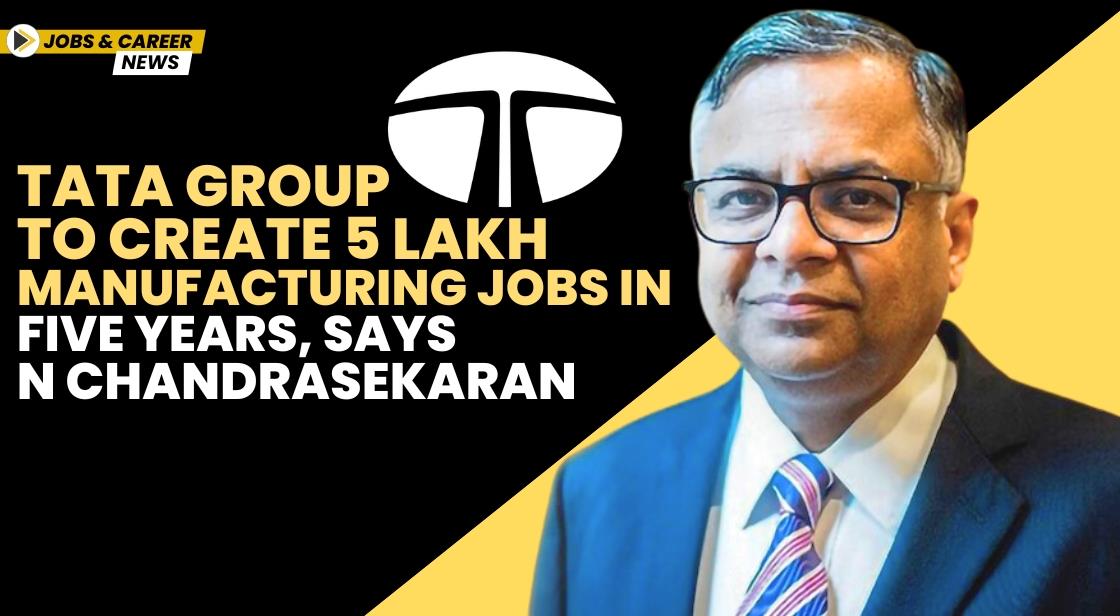Tata Group to Create 5 Lakh Manufacturing Jobs in Five Years, Says N Chandrasekaran

Podcast
News Synopsis
The Tata Group is poised to make a significant impact on India's job market by generating 5 lakh jobs in the manufacturing sector within the next five years. This ambitious initiative encompasses various industries, including semiconductors, electric vehicles (EVs), batteries, and precision manufacturing. The announcement was made by N Chandrasekaran, Chairman of Tata Sons, during a symposium hosted by the Indian Foundation for Quality Management.
Tata Group's Ambitious Job Creation Plan
The Importance of Manufacturing for India's Development
N Chandrasekaran, Chairman of Tata Sons emphasized that the future progress of India hinges on its capacity to create robust employment opportunities in the manufacturing sector. He pointed out the pressing need for jobs in this field, especially as the country sees an influx of new workers entering the job market every month.
“In response to the rising demand for jobs, through our investments in semiconductors, electric vehicles, precision manufacturing, and related industries, Tata Group expects to generate 5 lakh jobs over the next five years,” he stated. He highlighted critical projects like the upcoming semiconductor plant in Assam and new manufacturing facilities for electric vehicles and batteries, which are set to play a pivotal role in job creation.
Job Creation's Multiplier Effect
The Tata Group's strategy doesn't just focus on direct employment. Chandrasekaran elaborated on the multiplier effect of job creation in manufacturing, stating that each direct job in sectors like semiconductors could potentially lead to up to ten additional indirect jobs. This approach aims to enhance overall economic growth and employment opportunities across various sectors.
Supporting Small and Medium Enterprises
Additionally, the investments from the Tata Group are expected to fuel the growth of small and medium enterprises (SMEs), with projections indicating the emergence of around 5 lakh new SMEs as part of the evolving ecosystem supporting these industries. This growth is vital for nurturing innovation and entrepreneurship within the country.
Government Support and the Vision for Viksit Bharat
Chandrasekaran expressed gratitude for the government's backing of these initiatives and reiterated that India's vision of becoming a "Viksit Bharat" (developed India) cannot be realized without substantial growth in manufacturing employment. “Every month, one million people join the workforce, and we need to create 100 million jobs,” he stated, underlining the urgency and necessity of creating new jobs in these emerging sectors.
About Tata Group
The Tata Group is one of India's largest and oldest multinational conglomerates, known for its significant contributions to various sectors, including steel, automobiles, IT, consumer goods, telecommunications, and hospitality. Founded in 1868 by Jamsetji Tata, the group has evolved into a global powerhouse with operations spanning over 100 countries across six continents.
Key Highlights of Tata Group
-
Diverse Business Portfolio: The Tata Group comprises more than 100 subsidiaries and affiliated companies, including:
-
Tata Steel: One of the top steel manufacturers in the world.
-
Tata Motors: Renowned for producing a wide range of vehicles, from passenger cars to commercial trucks, and has made significant strides in the electric vehicle sector.
-
Tata Consultancy Services (TCS): A leading global IT services, consulting, and business solutions organization.
-
Tata Power: A pioneer in the Indian power sector, focusing on renewable energy.
-
Tata Consumer Products: Involved in the food and beverage industry, known for brands like Tata Tea and Tata Salt.
-
-
Philosophy and Values: The Tata Group is known for its commitment to ethical business practices, corporate social responsibility, and sustainable development. The group places a strong emphasis on community welfare and environmental sustainability, reflected in its various philanthropic initiatives.
-
Global Reach: With a presence in various international markets, the Tata Group has established a reputation for quality and innovation. Its global acquisitions, including Jaguar Land Rover and Corus Steel, have further expanded its footprint and capabilities.
-
Innovation and R&D: The Tata Group invests heavily in research and development, focusing on innovation across its businesses. This commitment is evident in its development of electric vehicles, cutting-edge technology solutions, and sustainable practices.
-
Leadership: The Tata Group has been led by notable figures over the years, including J.R.D. Tata, who played a crucial role in its expansion and diversification. Currently, N. Chandrasekaran, as the Chairman of Tata Sons, is steering the group toward new growth opportunities, particularly in technology and sustainable industries.
-
Social Impact: Tata Group's philanthropic arm, the Tata Trusts, has been instrumental in various social initiatives, focusing on health care, education, rural livelihoods, and women empowerment, positively impacting millions of lives across India.
With a rich history spanning over 150 years, the Tata Group continues to be a significant player in the global economy, driving innovation and growth while maintaining a steadfast commitment to ethical practices and social responsibility. Its focus on emerging sectors, such as electric vehicles and digital technologies, positions the group to play a pivotal role in shaping India's future as a developed nation.
Conclusion
In summary, the Tata Group's initiative to create 5 lakh jobs in the manufacturing sector over the next five years reflects a strong commitment to bolstering India’s economic landscape. By investing in critical industries like semiconductors, electric vehicles, and precision manufacturing, the Tata Group not only aims to address the immediate employment needs of millions entering the job market but also envisions a broader economic impact through the multiplier effect of job creation.
The anticipated growth of small and medium enterprises alongside this effort will further stimulate innovation and entrepreneurship within the country. As emphasized by N Chandrasekaran, achieving the vision of a Viksit Bharat hinges on sustained growth in manufacturing employment, underscoring the crucial role the Tata Group will play in shaping India's future as a developed nation.





